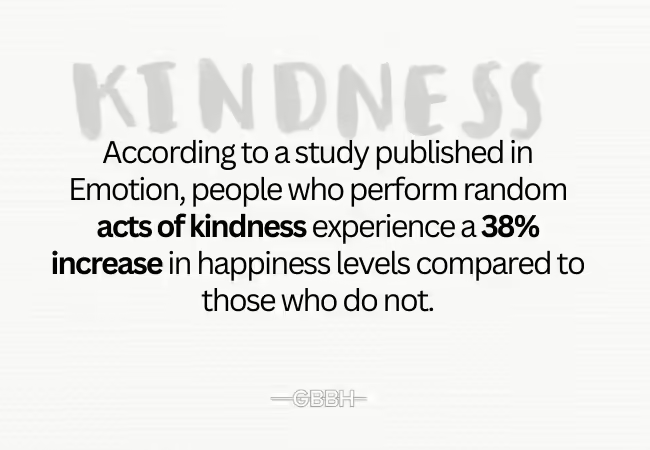Kindness is a powerful, underutilized tool for improving mental well-being. In our increasingly fast-paced and disconnected world, acts of kindness can provide meaningful relief from stress, anxiety, and depression. Research has shown that kindness is not only beneficial to the recipient but also positively impacts the mental and physical health of the giver.
At Greater Boston Behavioral Health, we focus on holistic approaches to mental health care. While clinical therapies such as our Mental Health Program, Intensive Outpatient Program (IOP), and Group Therapy Program are critical, incorporating kindness into everyday life offers a complementary way to enhance emotional resilience and foster stronger social connections.
The Science Behind Kindness and Mental Health
Kindness is more than a feel-good concept; it has biological underpinnings that directly impact mental health.
- Hormonal Benefits: Acts of kindness stimulate the release of oxytocin, often called the “love hormone,” which fosters feelings of trust and social bonding. This is particularly helpful in reducing stress and boosting emotional stability.
- Neurotransmitter Activation: Kindness boosts levels of serotonin and dopamine, the brain’s natural mood stabilizers. These neurotransmitters are often targeted in therapies for Depression Treatment and Anxiety Treatment.
- Cortisol Reduction: Multiple studies have shown that individuals who practice kindness regularly experience lower levels of cortisol, the hormone responsible for stress, leading to better overall mental health.
The Link Between Kindness and Mental Health
Kindness is deeply intertwined with mental health, serving as a natural remedy for emotional and psychological challenges. Scientific research reveals that acts of kindness activate specific areas in the brain associated with reward and social bonding, creating a sense of fulfillment and connection.
When we engage in kind acts, our brains release oxytocin, a hormone that promotes feelings of trust and empathy. Additionally, dopamine and serotonin, two neurotransmitters linked to mood regulation, increase during moments of kindness, helping to alleviate symptoms of anxiety and depression. These physiological responses make kindness a powerful complement to traditional therapeutic interventions, such as Cognitive Behavioral Therapy (CBT) or Dialectical Behavioral Therapy (DBT).
Moreover, kindness fosters stronger interpersonal connections, which are essential for maintaining emotional stability. Whether you’re giving or receiving, kindness cultivates a sense of belonging that can counteract feelings of isolation and loneliness often associated with mental health struggles.
The Emotional and Physical Health Benefits of Kindness
Kindness not only enhances emotional well-being but also contributes significantly to physical health. From reducing stress to improving heart health, its benefits are holistic:
- Emotional Benefits: Kindness has been shown to lower levels of cortisol, the stress hormone, leading to improved emotional regulation. Regular acts of kindness can help combat mood disorders such as depression and anxiety, providing a sense of purpose and joy.
- Improved Relationships: Being kind strengthens social bonds, creating a support system that is crucial for mental health recovery and maintenance. This is especially relevant in programs like Family Therapy or Group Therapy, where kindness fosters empathy and cooperation.
- Physical Health Perks: Studies suggest that people who regularly engage in kind behaviors have lower blood pressure, better immune function, and reduced inflammation—all factors that support overall mental health.
How Kindness Addresses Anger and Anxiety
Kindness can be a transformative tool for managing anger and reducing anxiety, two challenges frequently addressed in mental health therapy programs:
- Anger Management: Responding with kindness in high-stress or conflict situations helps neutralize negative emotions and fosters empathy. Techniques like this are often emphasized in Anger Management Programs, helping individuals replace reactive behaviors with compassionate responses.
- Anxiety Reduction: Focusing on helping others can redirect attention away from self-focused worries, promoting mindfulness. This aligns well with approaches used in Cognitive Behavioral Therapy (CBT), where reframing thoughts and focusing on positive actions are key strategies.
Kindness as a Tool for Depression Treatment
Depression can leave individuals feeling disconnected and unmotivated. Kindness provides a natural antidote by fostering connection and purpose:
- Building Social Bonds: Engaging in kind acts can help alleviate feelings of isolation, a common symptom of depression.
- Boosting Self-Worth: Performing acts of kindness, no matter how small, helps individuals feel valued and purposeful, countering the apathy often associated with depression.
- Integrated Therapy: At Greater Boston Behavioral Health, we incorporate kindness exercises into evidence-based treatments like Dialectical Behavioral Therapy (DBT), helping individuals build emotional resilience and create a more fulfilling daily routine.
The Role of Kindness in Family and Group Therapy
Kindness can be a transformative force in therapeutic settings, particularly in Family Therapy Programs and Group Therapy Programs.
- Family Therapy: Encouraging kind communication within families can improve strained relationships, rebuild trust, and create a supportive home environment. Small acts of kindness can break cycles of tension and foster mutual understanding.
- Group Therapy: In a group setting, kindness is often expressed through listening, validating others’ experiences, and offering support. This creates a sense of community and shared healing, which can be especially empowering for individuals navigating similar struggles.
The Physical and Emotional Health Benefits of Kindness
The benefits of kindness extend beyond emotional well-being to improve physical health, which is closely tied to mental health:
- Reduced Blood Pressure: Acts of kindness trigger oxytocin production, which has been shown to lower blood pressure and improve heart health.
- Better Sleep: Being kind can reduce stress and anxiety, leading to improved sleep quality, which is essential for emotional regulation.
- Increased Longevity: Studies have found that individuals who consistently engage in altruistic behaviors tend to live longer, healthier lives.
Simple Acts of Kindness to Boost Mental Health
Incorporating kindness into your daily life doesn’t require grand gestures. Even small acts can have a significant impact:
- Offer genuine compliments to friends or strangers.
- Help a neighbor or coworker with a task.
- Volunteer your time to a local charity or community event.
- Practice active listening with loved ones or colleagues.
- Send a kind message to someone you haven’t spoken to in a while.
These simple actions not only make a difference in others’ lives but also create a sense of fulfillment and connection that enhances your mental health.
Small Acts of Kindness That Make a Big Difference
Kindness doesn’t have to be grand or costly; even small actions can have a profound impact on mental health. Here are a few simple yet meaningful ways to practice kindness daily:
- Smile or Offer a Compliment: A genuine smile or kind word can brighten someone’s day and strengthen social connections.
- Volunteer Your Time: Helping at a local shelter, food bank, or community event can create a sense of purpose and belonging.
- Listen Actively: Show empathy and attention when someone shares their feelings, reinforcing their sense of value.
- Write a Note of Gratitude: Expressing appreciation to a friend, family member, or colleague can boost both their mood and yours.
- Help with Small Tasks: Offering to carry groceries or assist a coworker with a task can create a ripple of positivity.
The Ripple Effect of Kindness in Society
Kindness has a unique way of spreading beyond the individual, creating a ripple effect that benefits entire communities. When someone experiences an act of kindness, they are more likely to pay it forward, initiating a chain reaction of positive behavior.
This ripple effect promotes a sense of shared humanity, reducing social tensions and encouraging empathy. In mental health contexts, such as Group Therapy Programs or Intensive Outpatient Programs (IOP), the ripple effect fosters a supportive environment where individuals feel empowered to help others while also benefiting themselves.
On a larger scale, communities that prioritize kindness often see reduced stigma surrounding mental health. Acts of kindness can encourage open conversations, making it easier for individuals to seek support from programs like Partial Hospitalization Programs (PHP) or Mental Health Therapy Programs.
By nurturing kindness within our families, workplaces, and communities, we can create a society where mental health is supported and celebrated. This collective approach underscores the transformative power of kindness—not just for individuals, but for everyone they touch.
The Role of Professional Mental Health Programs
While kindness is a powerful supplement to mental health care, it is not a substitute for professional treatment. If you or someone you know is struggling with persistent mental health challenges, seeking professional help is crucial.
At Greater Boston Behavioral Health, we offer a range of tailored services, including:
- Mental Health Programs
- Partial Hospitalization Programs (PHP)
- Intensive Outpatient Programs (IOP)
- Evidence-based therapies such as CBT and DBT
- Holistic and integrative approaches, including kindness-focused exercises
Final Thoughts
Kindness is a simple yet profoundly effective way to improve mental health. It fosters emotional well-being, strengthens social connections, and complements professional treatment programs. Whether through small daily acts or intentional therapy practices, kindness can help individuals navigate their mental health journey with greater resilience and positivity.
At Greater Boston Behavioral Health, we believe in the power of kindness and compassion as part of a comprehensive approach to mental health care. Contact us today to learn more about our services and how we can support you or your loved one on the path to healing. Call us at (888)278-0716 today to learn more about our services and how we can help you on your journey to recovery!
FAQ on Can Kindness Improve Mental Health?
How does kindness benefit mental health?
Kindness improves mental health by reducing stress, boosting mood, and fostering social connections. It triggers the release of hormones like oxytocin and serotonin, which promote happiness and reduce anxiety or depression.
Can small acts of kindness make a significant impact?
Yes, even small gestures like offering a compliment or helping with a task can improve both your mental health and that of others, creating a positive ripple effect.
Does kindness help with specific mental health conditions?
Kindness can complement treatments for conditions like anxiety and depression by reducing feelings of loneliness and improving emotional resilience. It pairs well with therapies like CBT and DBT.
How can I practice kindness daily?
You can practice kindness by volunteering, expressing gratitude, actively listening to others, or performing simple acts like smiling or helping someone in need.
Is kindness part of professional mental health therapy?
Yes, kindness is often integrated into therapies such as group or family therapy, where empathy and understanding are encouraged to build trust and improve relationships.
Can kindness replace traditional mental health treatments?
While kindness has many mental health benefits, it is not a substitute for professional care. Programs like Intensive Outpatient Programs (IOP) or Partial Hospitalization Programs (PHP) provide comprehensive support for mental health challenges.


